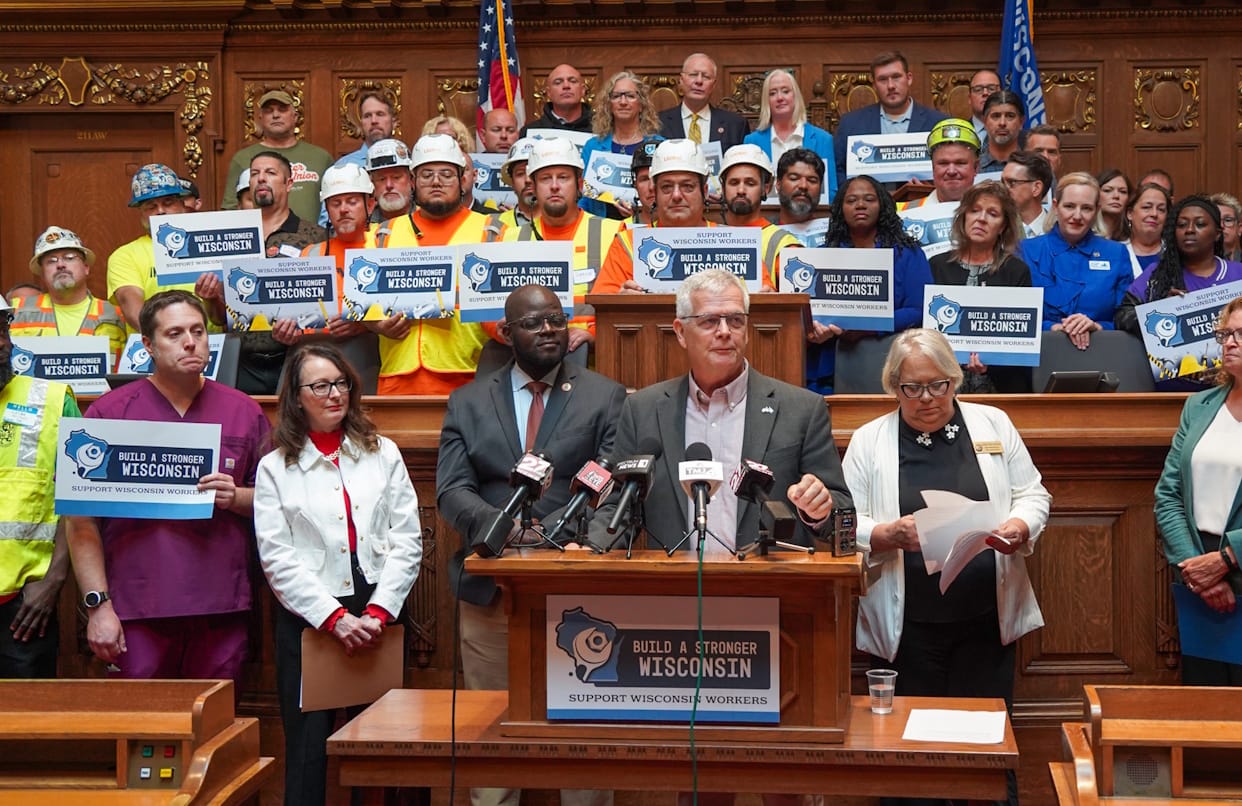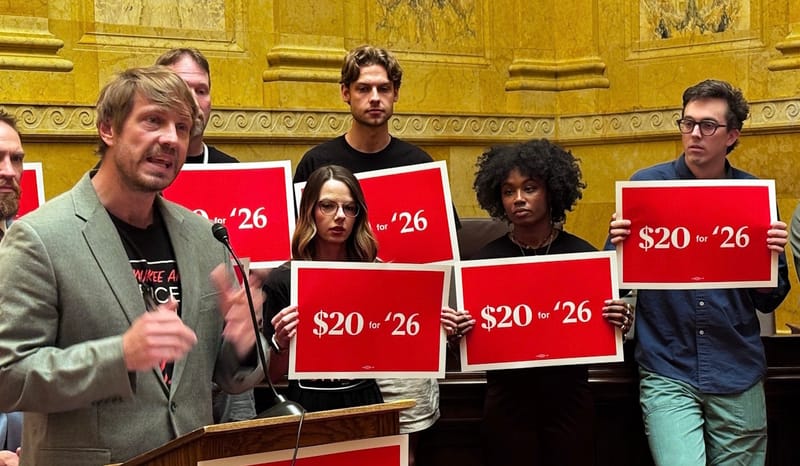Dems unleash set of laws to restore rescinded worker rights
Lawmakers seek 'to focus on policies that uplift the middle and working class and support Wisconsin’s economic growth.'

All sixty Wisconsin Legislative Democrats stood with labor leaders to introduce the "Build a Stronger Wisconsin" bill package at the State Capitol on Sept. 4. The package of four bills would repeal the right-to-work law, address worker misclassification, restore prevailing wage, and repeal the ban on Project Labor Agreement (PLA).
“The middle class is shrinking under disastrous economic policies at the federal level, and instead of more tax cuts for the one percent, we need to focus on policies that uplift the middle and working class and support Wisconsin’s economic growth through strong union jobs and pro-worker policies,” said Representative Lee Snodgrass (D-Appleton). “I am proud to join my legislative Democratic colleagues on these bills offering real, tangible solutions.”
This bill would repeal Wisconsin’s right-to-work law, which was enacted in 2015. The law prohibits agreements that require union membership or the payment of fees as a condition of employment. However, under the law, unions are still obligated to represent all employees within a bargaining unit, even those who are not union members or who choose not to pay dues.
Similarly, the 2011 Wisconsin Act 10 significantly curtails collective bargaining rights for most public sector employees. The law limits negotiations to base wage increases – capping them at the rate of inflation – and requires annual union recertification votes. Act 10 is currently being litigated and is expected to reach the Wisconsin Supreme Court later this year.
Historically, right-to-work states have lower wages and a higher workplace fatality rate. Union advocates blame that on right-to-work laws undermining and weakening unions.
The worker misclassification bill in the Democratic package would increase financial penalties on companies that misclassify an employee as an independent contractor – already illegal in the state – to avoid paying unemployment benefits or workers' compensation as well as social security, Medicare, and unemployment insurance taxes. An independent contractor also is denied protections under wage-and-hour laws or civil rights laws.
The bill would also extend outreach and education to employees about worker misclassification.
A third plank of the Democrats’ legislation would restore Wisconsin’s prevailing wage law. In 2017, Wisconsin repealed the law, which required contractors on state-funded projects to pay workers a prevailing wage rate based on local or regional standards.
“Nearly all our neighboring states, Illinois, Minnesota, Michigan, Iowa, still have prevailing wage laws,” said Senator Bob Wirch (D- Pleasant Prairie). “That means that skilled workers in places like my hometown of Kenosha often head across the border to Illinois to earn fair pay, taking their skills and taxpayers with them. Reinstating prevailing wage is about keeping our workers and our money here, rebuilding the middle class, and making sure a fair day's work means a fair day's pay.”
A study published in 2020 by the Midwest Economic Policy Institute found that in the years that followed the repeal, construction workers’ wages fell by about $2,600 a year, while highway construction costs increased.
The final plank of the package of legislation would once again mandate Project Labor Agreements (PLA) on public construction projects. In 2017, Gov. Scott Walker and the Republican-controlled legislature passed a law prohibiting state and local governments from mandating PLAs.
A PLA is a collective bargaining agreement between contractors and labor unions that sets consistent terms, including wages, benefits, and working conditions, for all contractors and subcontractors on a project.
PLAs had been in force for generations, including on the Fiserv Forum and the Marquette Interchange.
“It comes down to fairness in allowing workers to achieve good wages with strong union rights and making sure that we can have an economy that works for Wisconsin workers,” Stephanie Bloomingdale, President of Wisconsin State AFL-CIO, said. “We will make sure that Wisconsin is a great place for workers in this state.”






